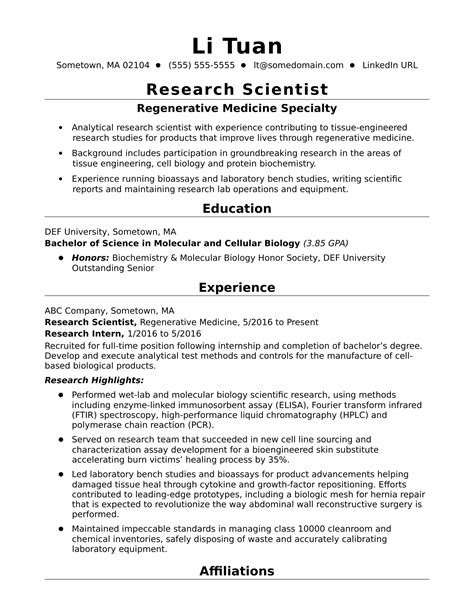Showcase your professional summary, research experience, technical skills, and academic achievements to stand out in your field. Expert SEO tips inside.Are you a scientist looking to create a standout resume? Crafting a compelling and effective resume can be a daunting task, especially in the competitive field of scientific research and academia. In this blog post, we will guide you through the essential components of a scientist’s resume, providing you with valuable tips and examples to help you land your dream job or academic opportunity. From creating a professional summary that captures your expertise and career goals to showcasing your research experience and technical skills, we’ve got you covered. Additionally, we’ll explore the best ways to demonstrate your academic achievements to impress potential employers or academic institutions. By the end of this post, you’ll have a clear understanding of how to tailor your resume to stand out in the scientific community. Let’s dive in and elevate your resume to new heights!
Creating a Professional Summary
Resume Examples Scientist
When crafting a professional summary for your resume as a scientist, it’s important to focus on your unique skills and experiences that set you apart from other candidates. Highlighting your specific areas of expertise and showcasing your passion for scientific research can help you stand out to potential employers.
Start by summarizing your years of experience in the scientific field, including any notable research projects you’ve worked on and any published papers or articles you’ve contributed to. Emphasize your strong understanding of scientific methodologies and your ability to analyze and interpret complex data.
Additionally, include any specialized technical skills you possess, such as proficiency in laboratory equipment and software programs. Highlighting your proficiency in conducting experiments, analyzing results, and drawing conclusions can demonstrate your value as a scientist in a competitive job market.
Highlighting Research Experience
Highlighting Research Experience
When it comes to building a strong resume as a scientist, it’s important to effectively highlight your research experience. This is often the most crucial aspect of your background that potential employers will be interested in. Whether you have conducted extensive lab research, collaborated on publications, or participated in scientific studies, showcasing your research experience can set you apart from other candidates.
One effective way to highlight your research experience on your resume is to create a dedicated section specifically for this information. Use bullet points to clearly outline the key research projects you have been involved in, the methods and techniques you have utilized, and any significant findings or results. Be sure to also include any publications or presentations that have resulted from your research, as these can add further credibility to your experience.
Furthermore, when describing your research experience, be sure to use action verbs to demonstrate the skills and competencies you have developed. For example, instead of simply stating “conducted research on cancer cells,” you could say “Designed and executed experiments to investigate the effects of specific treatments on cancer cells, resulting in valuable insights for potential therapeutic strategies.” This not only provides a more detailed explanation of your research activities, but also showcases your critical thinking and problem-solving abilities.
Showcasing Technical Skills
Showcasing Technical Skills
When creating a resume for a technical position, it is crucial to effectively showcase your technical skills. Employers in technical fields are looking for candidates who not only have the necessary technical knowledge, but also the ability to apply it in a professional setting. One way to do this is by incorporating a dedicated section on your resume that highlights your technical skills.
For example, if you are proficient in programming languages such as Python and Java, make sure to list these in a separate section on your resume. In addition to listing the languages, you can further showcase your skills by including specific projects or experiences where you utilized these languages. This not only demonstrates your technical proficiency, but also provides tangible examples of how you have applied your skills in real-world scenarios.
Furthermore, it’s important to keep your technical skills updated and relevant to the position you are applying for. If there are specific tools or technologies that are commonly used in your target industry, be sure to include these in your resume. Employers will be looking for candidates who are up-to-date with the latest technical advancements and are able to adapt to new technologies as needed.
Demonstrating Academic Achievements
When it comes to showcasing your academic achievements on your resume, it’s important to highlight the degrees, certifications, and honors you have earned throughout your educational journey. For example, if you have a Master’s degree in Chemistry, be sure to list this prominently in the education section of your resume. Additionally, if you have received any honors or awards such as Dean’s List or Phi Beta Kappa, these should also be included to demonstrate your academic excellence.
Another way to demonstrate your academic achievements on your resume is by showcasing any research projects or publications you have been involved in. Whether it’s a thesis, dissertation, or scientific paper, highlighting these accomplishments can show potential employers that you have a strong academic background and are capable of conducting in-depth research and analysis.
Furthermore, including any relevant coursework or academic projects in your field of study can also help to demonstrate your academic achievements. For example, if you are applying for a position as a scientist, listing specific courses or projects related to your scientific discipline can provide further evidence of your academic capabilities and expertise.
